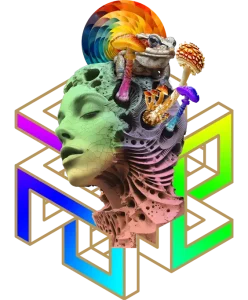Dimethyltryptamine (DMT) is a powerful psychedelic that has gained a reputation for inducing some of the most intense and otherworldly experiences of any known psychoactive substance. Commonly referred to as the “spirit molecule,” DMT is a naturally occurring compound found in a variety of plants and animals, and it is also produced in trace amounts in the human body. Despite its brief yet intense effects, DMT has captured the interest of researchers exploring its potential in treating mental health conditions such as depression, PTSD, and anxiety.
Known for producing vivid hallucinations and deeply spiritual experiences, DMT has long been used in shamanic practices, particularly in the context of ayahuasca ceremonies in the Amazon. Today, as psychedelics re-enter the realm of mental health research, DMT is being studied not only for its psychoactive effects but also for its potential therapeutic benefits.
What Exactly Is DMT?
DMT is a potent psychedelic compound that belongs to the tryptamine family, which also includes other well-known substances like psilocybin and LSD. It shares a structural similarity with serotonin, a neurotransmitter responsible for regulating mood, perception, and cognition. DMT is most commonly associated with ayahuasca, a traditional Amazonian brew that combines DMT-containing plants with a monoamine oxidase inhibitor (MAOI), allowing the psychoactive effects to last for several hours.
When taken in other forms, such as through smoking or vaporization, the effects of DMT are much shorter—typically peaking within minutes and dissipating after about 20 minutes. Despite the short duration, DMT induces a highly immersive experience characterized by vivid visuals, altered perceptions of reality, and often profound emotional or spiritual revelations.
The ‘Spirit Molecule’: DMT’s Mystical Reputation
The nickname “spirit molecule” originates from the intense spiritual and mystical experiences that users often report while under the influence of DMT. Many people describe their trips as profound, otherworldly, and sometimes life-altering. Common themes include encounters with seemingly sentient beings, feelings of unity with the universe, or journeys to alternate dimensions.
Indigenous cultures in the Amazon have long recognized the spiritual significance of DMT-containing plants, using them in ceremonial contexts to foster healing, spiritual insight, and connection with the divine. These experiences have intrigued researchers and led to the question: could the profound, perspective-shifting nature of DMT offer therapeutic value for those struggling with mental health conditions?
DMT’s Therapeutic Promise
As the scientific community continues to explore the therapeutic potential of psychedelics, DMT has come under the spotlight as a possible tool for mental health treatment. Although its short duration presents certain challenges, DMT’s ability to create deep emotional and cognitive experiences makes it a compelling candidate for research into mental health applications.
1. Depression
Depression, particularly treatment-resistant depression, remains one of the most challenging mental health conditions to treat. Preliminary research suggests that DMT, like other psychedelics, can enhance neuroplasticity—the brain’s ability to form new neural connections. By promoting this rewiring process, DMT could help individuals break free from negative thought loops that often accompany depression.
Studies on other psychedelics, such as psilocybin, have shown that even a single psychedelic experience can lead to long-lasting improvements in mood. While research on DMT is still in its early stages, there is hope that its rapid and intense effects could offer similar benefits, particularly for individuals who have not found success with conventional antidepressants.
2. PTSD
DMT may also hold potential as a treatment for post-traumatic stress disorder (PTSD). Psychedelic experiences are often characterized by a sense of emotional release, and DMT’s intense nature may help individuals process and reframe traumatic memories. By allowing individuals to confront their trauma from a different perspective, DMT could reduce the emotional intensity tied to these memories and promote healing.
For people with PTSD, where traumatic memories can feel inescapable and debilitating, DMT could provide an opportunity to experience their trauma in a way that fosters understanding and resolution.
3. End-of-Life Anxiety
The prospect of death can be accompanied by intense anxiety, especially for individuals facing terminal illness. Psychedelics like DMT have been shown to offer comfort to those struggling with end-of-life anxiety by inducing feelings of peace, acceptance, and connection with something greater than oneself. While research specifically focused on DMT for this purpose is limited, studies on similar psychedelics like psilocybin have demonstrated that these substances can significantly reduce existential fear and anxiety.
How DMT Affects the Brain
Like other psychedelics, DMT exerts its effects by interacting with serotonin receptors in the brain, particularly the 5-HT2A receptor, which is involved in regulating mood, perception, and cognition. By activating these receptors, DMT induces the powerful hallucinations and cognitive shifts that define the experience.
Another important aspect of DMT’s action is its ability to promote neuroplasticity, which enhances the brain’s capacity to form new pathways and connections. This process is thought to be central to the therapeutic effects of psychedelics, allowing individuals to break out of rigid, unhealthy patterns of thinking and behavior that contribute to conditions like depression and PTSD.
Additionally, there is some speculation that DMT may play a role in near-death experiences (NDEs), as the brain naturally produces small amounts of the compound. Some researchers theorize that DMT release during extreme situations, such as a near-death experience, could explain the vivid, mystical phenomena often reported in NDEs. However, this connection remains speculative and requires further investigation.
Challenges in Using DMT for Therapy
Despite its therapeutic potential, DMT presents several challenges for use in clinical settings. One of the most significant obstacles is the brief duration of its effects. Unlike other psychedelics, which may last several hours, DMT’s peak effects are over within 10 to 20 minutes. This rapid onset and short duration can make it difficult to use in therapeutic contexts where extended sessions are often beneficial for processing emotions and insights.
Moreover, DMT’s intensity can be overwhelming for some individuals, particularly those unfamiliar with psychedelic experiences. Without proper preparation and support, the rapid and immersive nature of a DMT trip may lead to confusion, anxiety, or distress. This highlights the importance of administering DMT in a controlled, supportive environment with trained professionals who can guide the individual through the experience.
Additionally, DMT is not suitable for everyone. Individuals with a history of certain mental health conditions, such as schizophrenia or psychosis, may be at higher risk for adverse reactions to psychedelics. Careful screening and medical oversight are essential to ensure the safety of any psychedelic-assisted therapy.
The Future of DMT in Mental Health Treatment
As research on psychedelic therapy expands, DMT’s role in mental health treatment will likely grow. While much attention has been focused on substances like psilocybin and MDMA, DMT’s unique properties—its rapid onset, profound effects, and ability to promote neuroplasticity—make it a promising candidate for further study.
Some researchers believe that DMT could be especially useful in crisis situations where immediate intervention is needed. Because its effects are short-lived, DMT may offer a way to provide rapid relief from mental health symptoms without the extended duration of other psychedelics. However, more clinical trials are needed to determine the optimal settings, dosing, and long-term effects of DMT therapy.
Conclusion: The ‘Spirit Molecule’ and Its Emerging Role in Therapy
DMT, often called the “spirit molecule” for the profound and mystical experiences it induces, is showing promise as a tool for mental health treatment. From enhancing neuroplasticity to offering new perspectives on trauma and emotional distress, DMT’s therapeutic potential is beginning to be recognized in the broader field of psychedelic research.
While challenges remain, including its short duration and intensity, the growing interest in DMT reflects a shift towards more innovative approaches to mental health. As researchers continue to study the benefits and risks of this powerful psychedelic, DMT may eventually become an important component of the psychedelic-assisted therapy toolkit, providing new hope for individuals seeking relief from depression, PTSD, and other mental health conditions

